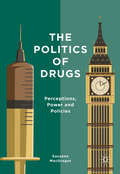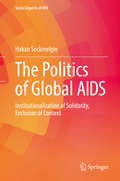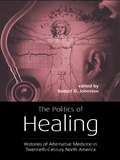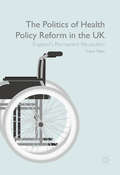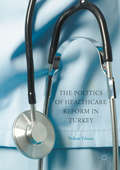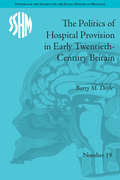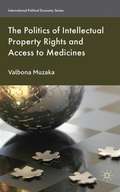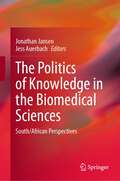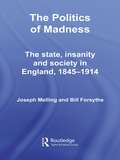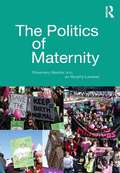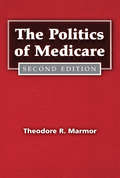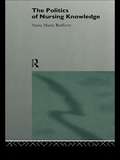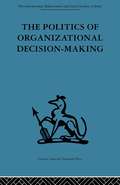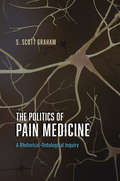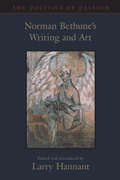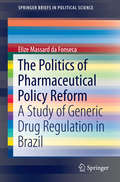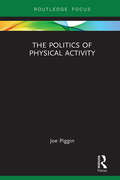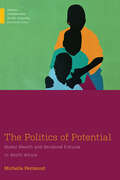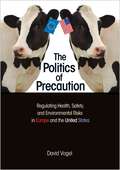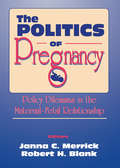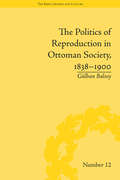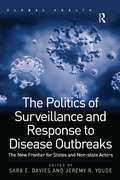- Table View
- List View
The Politics of Blood
by Anne-Maree FarrellHow best to manage risk involving multi-valued human biological materials is the overarching theme of this book, which draws on the sourcing and supply of blood as a case study. Blood has ethical, social, scientific and commercial value. This multi-valuing process presents challenges in terms of managing risk, therefore making it ultimately a matter for political responsibility. This is highlighted through an examination of the circumstances that led to HIV blood contamination episodes in the US, England and France, as well as their consequences. The roles of scientific expertise and innovation in managing risks to the blood system are also analysed, as is the increased use of precautionary and legal strategies in the post-HIV blood contamination era. Finally, consideration is given to a range of policy and legal strategies that should underpin effective risk governance involving multi-valued human biological materials.
The Politics of Drugs
by Susanne MacgregorThis book explores the complexities of drugs policy in Britain, contradicting the over simplified representation found in the public sphere. It focuses on developments in Britain since the Misuse of Drugs Act of 1971, covering debates at national level and local experiences set in international and European context, emphasizing the interconnectivity between people and countries in this global age. Several institutions and networks are examined to illustrate how they shape the policy process as vessels for ideas and interests and as spaces for individual action. MacGregor discusses arguments around drug policy reform, in particular the role of politicians, the media and advocacy organizations. Her aim is to encourage a more open and intelligent conversation on drugs policy and to question whether the institutional architecture in place is fit for purpose given the great increase of substances available and the underlying variety of conditions and interests currently competing for attention and resources. The is a must read for all scholars of Politics, Medicine and Social Science interested in the current debate raging around British Drug Policy.
The Politics of Global AIDS
by Hakan SeckinelginThis timely book looks critically at the policy response to AIDS and its institutionalization over time. It raises important questions about who benefits, who decides, and in whose interests decisions are made. Taking the early international response to the epidemic as its starting point, and focusing on the work of agencies such as UNAIDS, it identifies two logics underpinning strategy to date. First, the idea of HIV as a 'global emergency' which calls for an extraordinary response. Second, the claim that medicine offers the best way of dealing with it. The book also identified the rise of something more dominant - namely Global AIDS - or the logic and system that seeks to displace all others. Promulgated by UNAIDS and its partner agencies, Global AIDS claims to speak the truth on behalf of affected persons and communities everywhere. Founded on solidarity claims concerning the international HIV movement, and distinctive knowledge practices which determine what needs to be done. Alternative views about the nature of the epidemic or the best response are rejected as irrelevant for falling outside the master framing of the epidemic that Global AIDS provides. But to what extent is this biomedical and emergency framing of the epidemic sustainable, and to what extent does it speak to the sustainability of lives as affected people wish them to be lived? Does scientific and biomedical advance provide all the answers, or do important social and political issues need to be addressed? This book provides an innovative framework with which to think about these and other sustainability challenges for the future.
The Politics of Healing: Histories of Alternative Medicine in Twentieth-Century North America
by Robert D. JohnstonFirst Published in 2004. Routledge is an imprint of Taylor & Francis, an informa company.
The Politics of Health Care Reform: Lessons from the Past, Prospects for the Future
by James A. Morone Gary S. BelkinThis distinguished collection stands out from the recent flurry of books on health reform by its sustained and sophisticated analysis of the political dimension. In The Politics of Health Care Reform, some of America's best-known political scientists, historians, and legal scholars make sense of our most turbulent policy issue. They dig below the jargon and minutiae to explore the enduring questions of American politics, government reform, and health care.The Politics of Health Care Reform explains how successful reforms occur in the United States and shows what is unique about health care issues. Theoretically informed, politically astute, historically nuanced, this volume takes an inventory of our health policy infrastructure. Here is an account of the institutions, ideas, and interests that shape health policy in the 1990s: Congress, the federal courts, interest groups, state governments, the public bureaucracy, business (large and small), the insurance industry, the medical profession. The volume offers a fresh look at such critical matters as public opinion, the politics of race and gender, and the lessons we can draw from other nations.The Politics of Health Care Reform is the definitive collection of political science essays about health care. Expanded from two special issues of the Journal of Health Politics, Policy and Law, the most prominent scholarly journal in the field it helped create, this collection will enliven the present debate over health reform and instruct everyone who is concerned about the future of American health care.Contributors. Lawrence Brown, Robert Evans, William Glaser, Colleen Grogan, Robert Hackey, Lawrence Jacobs, Nancy Jecker, Taeku Lee, Joan Lehman, David McBride, Ted Marmor, Cathie Jo Martin, James A. Morone, Mark Peterson, David Rochefort, Rand Rosenblatt, David Rothman, Joan Ruttenberg, Mark Schlesinger, Theda Skocpol, Michael Sparer, Deborah Stone, Kenneth Thorpe
The Politics of Health Policy Reform in the UK
by Calum PatonThis book explains the politics of thirty years of 'market reform' in the English NHS, with the rest of the UK a counter-factual. Paton shows how each subsequent reform has been shaped by the confusion left by the previous reform. The long-term ideology has been anti-statist but policy-making at each stage of 'reform' has been driven by short-term politics. The outcome in England has been ever-increasing complexity in the NHS, with significantly increased management costs and no commensurate benefit.
The Politics of Healthcare Reform in Turkey
by Volkan YilmazThis book explores the transformation in the healthcare system in Turkey since 2003, which has been portrayed as a benchmark for building universal healthcare systems in emerging market economies. Focussing on healthcare politics in an under-researched developing country context, it fills a significant lacuna in existing scholarship. This study answers these questions: What were the political dynamics that enabled the introduction of healthcare reform in Turkey? What political conflicts did the reform generate? How and to whose benefit have these conflicts been resolved? Drawing on qualitative interviews with a diverse set of actors, Yılmaz explores the actors’ subjective interpretations of the reform, the discourses and strategies they used to influence the reform, and the changing healthcare politics scene. He demonstrates that the reform has been a complex political process within which actors negotiated whether and to what extent healthcare remains a citizenship right or a commodity. This book will appeal to students and scholars of social policy, politics, health policy, public health and sociology.
The Politics of Hospital Provision in Early Twentieth-Century Britain (Studies for the Society for the Social History of Medicine #19)
by Barry M DoyleDoyle examines the role of local and national politics on hospitals. Ultimately, Doyle argues that social and economic diversity created a number of models for future health care which rested on a combination of voluntary and municipal provision.
The Politics of Intellectual Property Rights and Access to Medicines
by Valbona MuzakaThis book shows why contests over intellectual property rights and access to affordable medicines emerged in the 1990s and how they have been 'resolved' so far. It argues that the current arrangement mainly ensures wealth for some rather than health for all, and points to broader concerns related to governing intellectual property solely as capital
The Politics of Knowledge in the Biomedical Sciences: South/African Perspectives
by Jonathan Jansen Jess AuerbachIn the wake of the decolonization movement in South Africa and around the world, this edited work presents fresh evidence and advances new arguments on the politics and economics of colonial biomedical knowledge in South Africa and other parts of the African continent. Covering a richly diverse set of fields---including human genetics, obstetrics, occupational therapy, medical photography and the vaccine sciences---the book demonstrates the troubled histories and the enduring effects of imperial knowledge decades since the end of colonial rule and apartheid. This is a valuable text on the politics of the biomedical sciences written from the perspective of the African continent, and at the same time it revisits knowledge/power relationships between the majority (“global South”) and minority (“global north”) words in a historical perspective and in their contemporary expression in the disciplines. The immediate benefit is a reference resource for medical science researchers, and a teaching text for senior undergraduate and postgraduate students. The book is further composed as an accessible, readable and interesting text on politics and medicine in Africa for the discerning lay reader.
The Politics of Madness: The State, Insanity and Society in England, 1845–1914 (Routledge Studies in the Social History of Medicine #Vol. 20)
by Joseph Melling Bill ForsytheThe discovery and treatment of insanity remains one of the most debated and discussed issues in social history. Focusing on the second half of the nineteenth century, The Politics of Madness provides a new perspective on this important topic, based on research drawn from both local and national material. Within a social and cultural history of the English political and class order, it presents a fresh appraisal of the significance of the asylum in the decades following the creation of a national asylum system in 1845. Arguing that the new asylums provided a meeting place for different social interests and aspirations, the text asserts that this then marked a transition in provincial power relations from the landed interests to the new coalition of professional, commercial and populist groups, which gained control of the public asylums at the end of the period surveyed.
The Politics of Maternity
by Rosemary Mander Jo Murphy-LawlessThe evidence surrounding the skills and approaches to support good birth has grown exponentially over the last two decades, but so too have the obstacles facing women and midwives who strive to achieve good birth. This new book critically explores the complex issues surrounding contemporary childbirth practices in a climate which is ever more medicalised amidst greater insecurity at broad social and political levels. The authors offer a rigorous, and thought-provoking, analysis of current clinical, managerial and policy-making environments, and how they have prevented sustaining the kind of progress we need. The Politics of Maternity explores the most hopeful developments such as the abundant evidence for one-to-one care for women, and sets these accounts against the background of changes in health service organisation and provision that block these approaches from becoming an everyday occurrence for women giving birth. The book sets out the case for renewed attention to the politics of childbirth and what this politics must entail if we are to give birth back to women. Designed to help professionals cope with the transition from education to the reality of the system within which they learn and practise, this inspiring book will help to assist them to function and care effectively in a changing health care environment.
The Politics of Medicare (Social Institutions And Social Change Ser.)
by Theodore R. MarmorOn July 30, 1965, President Johnson flew to Independence, Missouri to sign the Medicare bill. The new statute included two related insurance programs to finance substantial portions of the hospital and physician expenses incurred by Americans over the age of sixty-five. Public attempts to improve American health standards have typically precipitated bitter debate, even as the issue has shifted from the professional and legal status of physicians to the availability of hospital care and public health programs. In The Politics of Medicare, Marmor helps the reader understand Medicare's origins, and he interprets the history of the program and explores what happened to Medicare politically as it turned from a legislative act in the mid-1960s to a major program of American government in the three decades since. This is a vibrant study of an important piece of legislation that asks and answers several questions: How could the American political system yield a policy that simultaneously appeased anti-governmental biases and used the federal government to provide a major entitlement? How was the American Medical Association legally overcome yet placated enough to participate in the program? And how did the Medicare law emerge so enlarged from earlier proposals that themselves had caused so much controversy?
The Politics of Nursing Knowledge
by Anne Marie RaffertyThe Politics of Nursing Knowledge puts into context the historical factors which have shaped and sometimes limited the development of nurse education. Anne Marie Rafferty makes a critical reappraisal of Florence Nightingale's vision of nursing and looks at how training and policy-making have evolved from the origins of hospital reform in the 1860s to the start of the National Health Service in 1948.Highlighting the contemporary issues confronting all those in training, the book questions the extent to which nursing fits into the mould of both a profession and an academic discipline. Based on substantial new research, The Politics of Nursing Knowledge is a valuable resource for nursing students at undergraduate and postgraduate levels.
The Politics of Organizational Decision-Making
by Andrew M. PettigrewTavistock Press was established as a co-operative venture between the Tavistock Institute and Routledge & Kegan Paul (RKP) in the 1950s to produce a series of major contributions across the social sciences. This volume is part of a 2001 reissue of a selection of those important works which have since gone out of print, or are difficult to locate. Published by Routledge, 112 volumes in total are being brought together under the name The International Behavioural and Social Sciences Library: Classics from the Tavistock Press. Reproduced here in facsimile, this volume was originally published in 1973 and is available individually. The collection is also available in a number of themed mini-sets of between 5 and 13 volumes, or as a complete collection.
The Politics of Pain Medicine: A Rhetorical-Ontological Inquiry
by S. Scott GrahamChronic pain is a medical mystery, debilitating to patients and a source of frustration for practitioners. It often eludes both cause and cure and serves as a reminder of how much further we have to go in unlocking the secrets of the body. A new field of pain medicine has evolved from this landscape, one that intersects with dozens of disciplines and subspecialties ranging from psychology and physiology to anesthesia and chiropractic medicine. Over the past three decades, researchers, policy makers, and practitioners have struggled to define this complex and often contentious field as they work to establish standards while navigating some of the most challenging philosophical issues of Western science. In The Politics of Pain Medicine: A Rhetorical-Ontological Inquiry, S. Scott Graham offers a rich and detailed exploration of the medical rhetoric surrounding pain medicine. Graham chronicles the work of interdisciplinary pain management specialists to found a new science of pain and a new approach to pain medicine grounded in a more comprehensive biospychosocial model. His insightful analysis demonstrates how these materials ultimately shape the healthcare community's understanding of what pain medicine is, how the medicine should be practiced and regulated, and how practitioner-patient relationships are best managed. It is a fascinating, novel examination of one of the most vexing issues in contemporary medicine.
The Politics of Pain Medicine: A Rhetorical-Ontological Inquiry
by S. Scott GrahamChronic pain is a medical mystery, debilitating to patients and a source of frustration for practitioners. It often eludes both cause and cure and serves as a reminder of how much further we have to go in unlocking the secrets of the body. A new field of pain medicine has evolved from this landscape, one that intersects with dozens of disciplines and subspecialties ranging from psychology and physiology to anesthesia and chiropractic medicine. Over the past three decades, researchers, policy makers, and practitioners have struggled to define this complex and often contentious field as they work to establish standards while navigating some of the most challenging philosophical issues of Western science. In The Politics of Pain Medicine: A Rhetorical-Ontological Inquiry, S. Scott Graham offers a rich and detailed exploration of the medical rhetoric surrounding pain medicine. Graham chronicles the work of interdisciplinary pain management specialists to found a new science of pain and a new approach to pain medicine grounded in a more comprehensive biospychosocial model. His insightful analysis demonstrates how these materials ultimately shape the healthcare community’s understanding of what pain medicine is, how the medicine should be practiced and regulated, and how practitioner-patient relationships are best managed. It is a fascinating, novel examination of one of the most vexing issues in contemporary medicine.
The Politics of Passion: Norman Bethune's Writing and Art
by Larry Hannant Norman BethuneThe Politics of Passion is the first comprehensive collection of the writing and art of Dr Norman Bethune. A Canadian medical pioneer and a communist, Bethune gained fame during the 1930s while serving in the Spanish Civil War and participating in China's struggle against Japanese invasion.This book sheds light on the man, the artist, and the revolutionary. It uncovers new historical material relating to several controversies surrounding Bethune. A remarkable document obtained from the Communist International Archives in Moscow, for instance, discusses why Bethune was sent home in disgrace from the Spanish Civil War. It refers to a mysterious Swedish woman, Kajsa von Rothman, who was Bethune's lover and who was believed by left-wing Spanish authorities to be politically suspect.This collection of Bethune's writings and art reveals that politics preoccupied him only during the last four years of his life. Earlier, his passionate nature found expression in medical and surgical innovation, as well as in painting, sketching, photography, writing - from poetry and short stories to letters, radio broadcasts, and plays - and public speaking. The Politics of Passion reveals the many sides of Bethune's identity, exploring not only the life of a revolutionary doctor, but of an intense and compassionate artist.
The Politics of Pharmaceutical Policy Reform
by Elize Massard da FonsecaBrazil is renowned worldwide for its remarkable reforms in pharmaceutical regulation, which have enhanced access to essential medicines while lowering drug costs. This book innovates by analysing the generic drug reform in Brazil, demonstrating that pharmaceutical regulation is only partially influenced by non-state actors. Little is known about the institutional antecedents and policy process that channeled this regulatory reform. This is particularly intriguing because a regulatory shift in the pharmaceutical sector requires the participation of a number of stakeholders and interest groups in the policy process. Fonseca examines the generic drug reform's causes and consequences. No study has approached the generic drug regulation in Brazil from this perspective. The Politics of Pharmaceutical Policy Reform: A Study of Generic Drug Regulation in Brazil, explores the following: · The politics of pharmaceutical regulation in Brazil over the last 25 years. · The political negotiations to approve the Generic Drug Act, which involved a hard-to-reach agreement between the pharmaceutical industry (national and multinational), the Ministry of Health, and Congress · The controversial decisions to regulate packaging and pharmaceutical equivalence. · The surprising success of Brazilian pharmaceutical firms, which became market champions in a sector largely dominated by multinational firms. · Comparative lessons from the Brazilian case for the political construction of regulatory standards to regulate generic drugs and its effects on global health. This book will interest political scientists and health policy scholars concerned with the political conflicts in the pharmaceutical sector. It argues against well-established approaches to regulatory capture such as control of the regulatory process by interest groups and policy diffusion. It can be used as evidence for graduate courses in public policy, health policy and political science. Because Brazil is one of the largest markets for pharmaceuticals in the world, business leaders and consultancy firms would also be interested.
The Politics of Physical Activity (Routledge Research in Physical Activity and Health)
by Joe PigginDefining ‘politics’ as contests over ideas, values and visions about what a physically active society could be, this book uses critical analysis to challenge accepted truths about physical activity and therefore opens up a pathway to more effective, and more socially just, physical activity policy. Critiquing global and national physical activity policies which are arguing for significant change to societies around the world, The Politics of Physical Activity presents empirical case studies to illustrate the political dimensions of advocating for physical activity promotion, including discussions of resourcing difficulties, conflicts of interest and opportunity costs. It explores physical activity as a multi-sectoral tool that is being applied to political ideas and policy goals as varied as education, sustainability and social cohesion, and asks what good physical activity really looks like. This is important and provocative reading for any student, researcher, practitioner or policy maker with an interest in physical activity, public health or public policy.
The Politics of Potential: Global Health and Gendered Futures in South Africa (Medical Anthropology)
by Michelle PentecostThe first one thousand days of human life, or the period between conception and age two, is one of the most pivotal periods of human development. Optimizing nutrition during this time not only prevents childhood malnutrition but also determines future health and potential. The Politics of Potential examines early life interventions in the first one thousand days of life in South Africa, drawing on fieldwork from international conferences, government offices, health-care facilities, and the everyday lives of fifteen women and their families in Cape Town. Michelle Pentecost explores various aspects of a politics of potential, a term that underlines the first one thousand days concept and its effects on clinical care and the lives of childbearing women in South Africa. Why was the First One Thousand Days project so readily adopted by South Africa and many other countries? Pentecost not only explores this question but also discusses the science of intergenerational transmissions of health, disease, and human capital and how this constitutes new forms of intergenerational responsibility. The women who are the target of first one thousdand days interventions are cast as both vulnerable and responsible for the health of future generations, such that, despite its history, intergenerational responsibility in South Africa remains entrenched in powerfully gendered and racialized ways.
The Politics of Precaution: Regulating Health, Safety, and Environmental Risks in Europe and the United States
by David VogelThe Politics of Precaution examines the politics of consumer and environmental risk regulation in the United States and Europe over the last five decades, explaining why America and Europe have often regulated a wide range of similar risks differently. It finds that between 1960 and 1990, American health, safety, and environmental regulations were more stringent, risk averse, comprehensive, and innovative than those adopted in Europe. But since around 1990, the book shows, global regulatory leadership has shifted to Europe. What explains this striking reversal? David Vogel takes an in-depth, comparative look at European and American policies toward a range of consumer and environmental risks, including vehicle air pollution, ozone depletion, climate change, beef and milk hormones, genetically modified agriculture, antibiotics in animal feed, pesticides, cosmetic safety, and hazardous substances in electronic products. He traces how concerns over such risks--and pressure on political leaders to do something about them--have risen among the European public but declined among Americans. Vogel explores how policymakers in Europe have grown supportive of more stringent regulations while those in the United States have become sharply polarized along partisan lines. And as European policymakers have grown more willing to regulate risks on precautionary grounds, increasingly skeptical American policymakers have called for higher levels of scientific certainty before imposing additional regulatory controls on business.
The Politics of Pregnancy: Policy Dilemmas in the Maternal-Fetal Relationship
by Janna C MerrickHere is a comprehensive overview and analysis of issues concerning the maternal-fetal relationship, from abortion to surrogate motherhood. Unlike many books which cover reproductive issues in general, this book focuses in-depth on one aspect of reproduction--the maternal-fetal relationship--to give readers a detailed study of the many issues involved. The Politics of Pregnancy discusses public policy dimensions of this relationship and posits new, critical political dilemmas. Many chapters in this unique book also provide significant clinical information as well as conceptual analysis.The Politics of Pregnancy offers great diversity in terms of the disciplinary backgrounds of the authors and their ideological perspectives. Authors come from many fields, including sociology, political science, pediatrics, ethics, and psychiatry, and provide diverse, sometimes opposing, analytical positions. Some of the topics they debate include: maternal substance use during pregnancy prenatal technology pregnancy and workplace hazards court-ordered obstetrical intervention fetal experimentationReaders interested in public and health care policy, nursing, feminism, pediatrics, or ethics, will find The Politics of Pregnancy to be a stimulating and thought-provoking book. This volume also makes an excellent discussion tool for graduate courses in these areas.
The Politics of Reproduction in Ottoman Society, 1838–1900 ("The Body, Gender and Culture")
by Gülhan BalsoyEpidemics, migration and territorial losses led to population decline in early nineteenth-century Turkey. In response, Ottoman elites began a programme of population growth. Balsoy uses previously untapped archival sources to examine these developments, arguing that these changes caused reproduction to become a political experience.
The Politics of Surveillance and Response to Disease Outbreaks: The New Frontier for States and Non-state Actors (Global Health)
by Jeremy R. Youde Sara E. DaviesThe capacity to conduct international disease outbreak surveillance and share information about outbreaks quickly has empowered both State and Non-State Actors to take an active role in stopping the spread of disease by generating new technical means to identify potential pandemics through the creation of shared reporting platforms. Despite all the rhetoric about the importance of infectious disease surveillance, the concept itself has received relatively little critical attention from academics, practitioners, and policymakers. This book asks leading contributors in the field to engage with five key issues attached to international disease outbreak surveillance - transparency, local engagement, practical needs, integration, and appeal - to illuminate the political effect of these technologies on those who use surveillance, those who respond to surveillance, and those being monitored.

